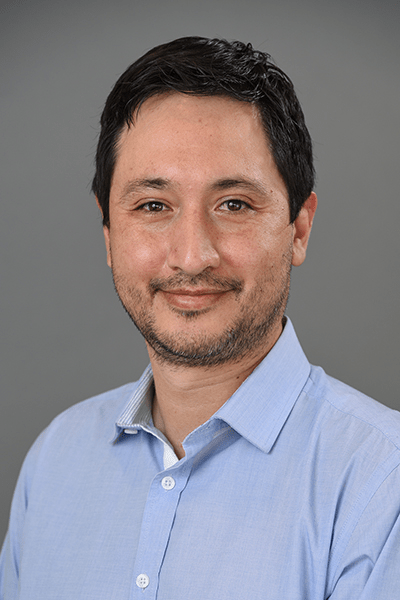
Braulio A. Munoz Ramirez, PhD
Assistant Professor of Biochemistry, Molecular Biology & Pharmacology
- bmunozra@iu.edu
- Phone
- 317-278-0807
- Address
-
635 Barnhill Dr
MS-A418D
Indianapolis, IN 46202 - PubMed:
-

Bio
Braulio Munoz is a Chilean native, who got his bachelor’s degree in Biochemistry from the University of Concepcion in Chile. He received his doctorate in Cellular and Molecular Biology from the University of Concepcion in Chile in 2016. Then, he moved to the USA to complete the postdoctoral training in the laboratory of Dr. Brady Atwood at Indiana University School of Medicine. Currently, Dr. Munoz is an Assistant Professor in the Department of Biochemistry, Molecular Biology & Pharmacology at Indiana University School of Medicine, with a specific focus on studying glutamatergic and inhibitory (GABA, glycine) synaptic plasticity within corticostriatal neurocircuits. Dr.Munoz's personal life, he is a father of three amazing girls, he loves Star Wars, Lego playsets, also he enjoys cooking, grunge music, playing videogames with his daughters, and spending outdoor time biking, hiking, and fishing with his wonderful wife and fantastic daughters.
Key Publications
Muñoz B, Gallegos S, Peters C, Murath P, Lovinger DM, Homanics GE and Aguayo LG. (2019). Influence of nonsynaptic α1 glycine receptors on ethanol consumption and place preference. Addiction Biology. https://doi.org/10.1111/adb.12726
Muñoz B, Fritz BM, Yin F and Atwood BK. (2018). Alcohol exposure disrupts mu opioid receptor-mediated long-term depression at insular cortex inputs to dorsolateral striatum. Nature Communications. 9(1): 1318.
Muñoz B, Haggerty D and Atwood BK. Synapse-specific expression of mu opioid receptor long-term depression in the dorsomedial striatum. Scientific Reports. 10 (1):7234. (2020). PMID: 32350330
Muñoz B and Atwood BK. (2023). A novel inhibitory corticostriatal circuit that expresses mu opioid receptor-mediated synaptic plasticity. Neuropharmacology. 10.1016/j.neuropharm.2023.109696. PMID: 37659438.
| Year | Degree | Institution |
|---|---|---|
| 2019 | Postdoctoral Training | Indiana University |
| 2016 | PhD | University of Concepcion |
| 2011 | BS | University of Concepcion |
The effects of alcohol on the brain have led my interest in the neurophysiological mechanisms of ethanol; first, in glycine receptors and currently in excitatory and inhibitory synaptic plasticity. Alcohol use disorders (AUDs) afflict millions of people in the United States and are a profound socioeconomic burden. AUDs and other addictive diseases include a shift from goal-directed to habitual, compulsive drug use.
I have a strong background in the study of inhibitory neurotransmitter receptors from my graduate training in Dr. Luis Aguayo’s lab in Chile. In addition, I acquired expertise during my postdoctoral training in Dr. Atwood’s laboratory on mu opioid-mediated and cannabinoid-mediated glutamatergic plasticity, resulting in a number of different significant publications including one first-author publication in Nature Communications. My mentors provided me with a broad skill set in brain slice electrophysiology, optogenetic manipulations of neural circuits, stereotaxic surgeries to infuse AAV viral vectors and implant optic probes, the use of transgenic mice, and the study of G protein-coupled receptor signaling mechanisms, inhibitory and excitatory transmission, and synaptic plasticity. My lab active research is the following:
The impact of alcohol on inhibitory corticostriatal transmission: The project assesses the impact of alcohol on inhibitory neural transmission in these brain regions and how manipulations of neural circuitry alter alcohol drinking consumption behavior in addition to related behaviors such as reward perception, anxiety, locomotor responses, and motivation. It is hoped that by better understanding the interactions between alcohol and the striatum inhibitory neurocircuits will reveal new and better therapeutics for treating AUDs.
Interactions between glycine receptor and alcohol drinking on dopaminergic function mediating AUD progression: In this project, we are investigating how dorsal striatal tonic glycinergic currents are modulated by binge alcohol consumption. In addition, we are seeking to determine how alcohol consumption interacts with dopamine release and or lesions affecting the role of tonic glycinergic currents regulating the excitatory-inhibitory balance within the dorsal striatum.
Parkinson’s Disease
The Impact of Dopamine Lesions on Glycine Receptors in Mediating Parkinson's Disease Progression: Parkinson's disease (PD) affects millions of people worldwide. Interestingly, both Alcohol Use Disorders (AUDs) and PD impact the basal ganglia, a brain region critical for regulating striatal reward and motor circuits. Currently, there is no treatment available to delay or stop the progression of PD. However, the most effective treatment to alleviate motor symptoms is the use of Levodopa, but prolonged use leads to dyskinesia and episodic psychosis events. Recent studies have shown that the progression of these symptoms can be treated using glycine transporter type 1(GlyT1) inhibitors such as bitopertin, which activate NMDA and glycine receptors (GlyRs). Interestingly, using GlyT1 inhibitor in the striatum (the nucleus of the basal ganglia), increases glycine concentration leading to the activation of striatal GlyRs, increasing dopamine release, and promoting neuroprotection.
While the role of GlyRs in the lasting impact of PD progression, particularly concerning motor-related behaviors later in life and on physiology, has received limited study, these receptors represent a compelling pharmacological target for treating PD.
The primary goal of this project is to determine the neuroprotective role of glycine receptors in mitigating or delaying PD progression.
Desc: Travel Award
Scope: National
Date: 2025-06-09
Desc: Travel Award
Scope: International
Date: 2023-07-11
Desc: Travel Award for poster and oral presentation
Scope: International
Date: 2017-07-11
Desc: “Diploma Lipschutz” for poster presentation
Scope: Regional
Date: 2016-01-15
Desc: Harold Kalant's 90th birthday LASBRA tribute award for poster presentation
Scope: International
Date: 2013-10-19
Desc: Fellowship for doctoral studies in Chile
Scope: National
Date: 2011-03-01